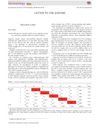 24 citations,
February 1987 in “Drugs”
24 citations,
February 1987 in “Drugs” Minoxidil promotes hair regrowth, but more research needed for effectiveness and response factors.
[object Object]  July 2008 in “Biomedical Imaging and Intervention Journal”
July 2008 in “Biomedical Imaging and Intervention Journal” New cancer treatments are more precise and less toxic, improving survival rates, but Asia faces challenges in adopting these advancements.
 1 citations,
December 2021 in “JAAD case reports”
1 citations,
December 2021 in “JAAD case reports” A woman with severe hair loss saw significant hair regrowth after adding platelet-rich plasma injections to her treatment with tofacitinib.
 41 citations,
September 2018 in “Australasian journal of dermatology”
41 citations,
September 2018 in “Australasian journal of dermatology” No systemic treatment for alopecia areata has strong evidence of effectiveness.
 27 citations,
December 2015 in “Clinical and Experimental Dermatology”
27 citations,
December 2015 in “Clinical and Experimental Dermatology” Diphencyprone helped most patients with alopecia areata regrow some hair.
 12 citations,
January 2011 in “Photodermatology, photoimmunology & photomedicine”
12 citations,
January 2011 in “Photodermatology, photoimmunology & photomedicine” This therapy effectively treats resistant alopecia areata with minimal side effects.
 10 citations,
April 2020 in “Dermatology and therapy”
10 citations,
April 2020 in “Dermatology and therapy” Calcipotriol works almost as well as clobetasol for mild to moderate alopecia areata with fewer side effects.
 9 citations,
May 2021 in “International Journal of Dermatology”
9 citations,
May 2021 in “International Journal of Dermatology” The trial showed that a new under-the-tongue treatment for severe hair loss was somewhat effective in a small group of people.
 October 2023 in “Dermatology practical & conceptual”
October 2023 in “Dermatology practical & conceptual” Pulse corticosteroids help regrow hair in alopecia areata but have side effects, especially betamethasone.
 51 citations,
December 2011 in “The Journal of Dermatology”
51 citations,
December 2011 in “The Journal of Dermatology” New treatments for severe hair loss often fail, but some patients see hair regrowth with specific therapies, and treatment should be tailored to the individual's situation.
 215 citations,
March 2011 in “Clinical Cancer Research”
215 citations,
March 2011 in “Clinical Cancer Research” Sorafenib is effective in treating Desmoid Tumor/Deep Fibromatosis.
 182 citations,
December 2017 in “Journal of the American Academy of Dermatology”
182 citations,
December 2017 in “Journal of the American Academy of Dermatology” Some treatments can help with a hair loss condition called alopecia areata, but none ensure lasting results; choices depend on the person, with JAK inhibitors showing promise for severe cases.
 36 citations,
December 2015 in “Drugs”
36 citations,
December 2015 in “Drugs” New treatments for a chronic skin condition show promise, but individualized plans are crucial due to varying responses.
 9 citations,
December 2017 in “The Journal of Allergy and Clinical Immunology”
9 citations,
December 2017 in “The Journal of Allergy and Clinical Immunology” New targeted therapies for hair loss from alopecia areata show promise, with personalized treatment expected in the future.
 1 citations,
October 2023 in “Dermatology and therapy”
1 citations,
October 2023 in “Dermatology and therapy” Some treatments for severe hair loss work but often have side effects, with baricitinib showing the most promise.
 1 citations,
June 2023 in “Advances in therapy”
1 citations,
June 2023 in “Advances in therapy” Ripretinib is effective and safe for treating advanced GIST in Chinese patients, particularly for non-gastric GISTs.
 April 2024 in “Canadian Journal of Ophthalmology”
April 2024 in “Canadian Journal of Ophthalmology” A woman with advanced eye cancer went into complete remission using a combination of immunotherapy and topical treatments.
December 2022 in “IntechOpen eBooks” 308 excimer phototherapy is a safe and effective way to treat hair loss from Alopecia Areata.
86 citations,
June 2018 in “Cochrane library” Mycophenolate mofetil may improve lupus nephritis remission more than cyclophosphamide but with uncertain safety.
132 citations,
November 1998 in “Journal of the American Academy of Dermatology” Topical sensitizers have mixed success in treating alopecia areata.
24 citations,
August 2020 in “JAMA dermatology” Persistent radiation-induced hair loss is dose-dependent, and treatments like topical minoxidil can be effective.
3 citations,
October 2012 in “DOAJ (DOAJ: Directory of Open Access Journals)” Pemetrexed with cisplatin is safer and more effective than gemcitabine with cisplatin for advanced lung cancer.
 July 2023 in “IntechOpen eBooks”
July 2023 in “IntechOpen eBooks” New treatments for alopecia areata show promise, but more research is needed to confirm their effectiveness.
 March 2022 in “Wound practice & research”
March 2022 in “Wound practice & research” New treatments for alopecia areata show promise, but standardized guidelines are needed.
 9 citations,
March 2022 in “Journal of radiation research”
9 citations,
March 2022 in “Journal of radiation research” Boron neutron capture therapy for head and neck cancer can cause side effects like mouth sores and skin irritation, which vary depending on where the treatment is aimed.
 1 citations,
August 2019 in “Australasian journal of dermatology”
1 citations,
August 2019 in “Australasian journal of dermatology” Immunotherapy can help treat severe alopecia areata.
 June 2023 in “Dermatology and therapy”
June 2023 in “Dermatology and therapy” The Middle East and Africa need better data, treatment consensus, and support for Alopecia Areata.
 April 2007 in “Nature Clinical Practice Urology”
April 2007 in “Nature Clinical Practice Urology” Teaching men with simple bladder problems self-management skills can improve their symptoms and quality of life.
 56 citations,
January 2021 in “Clinical and Experimental Medicine”
56 citations,
January 2021 in “Clinical and Experimental Medicine” The document concludes that while there are various treatments for Alopecia Areata, there is no cure, and individualized treatment plans are essential due to varying effectiveness.
[object Object]  50 citations,
March 2021 in “Journal of investigational allergology & clinical immunology”
50 citations,
March 2021 in “Journal of investigational allergology & clinical immunology” Dupilumab is being tested for many new skin, respiratory, and gastrointestinal conditions.

























